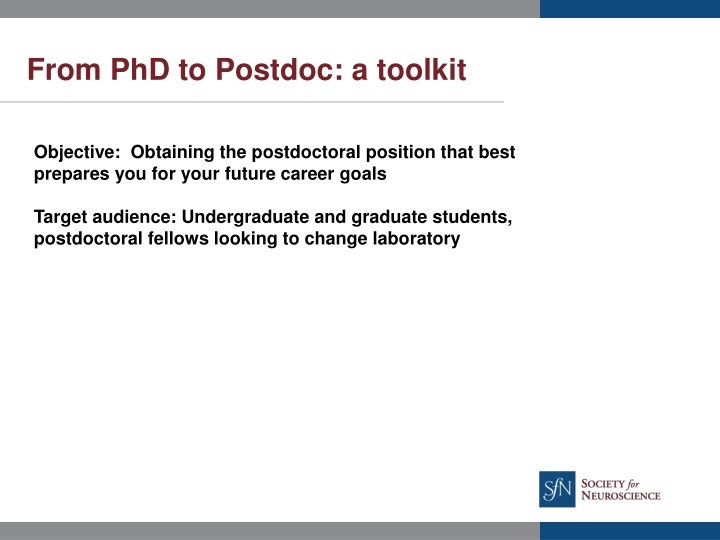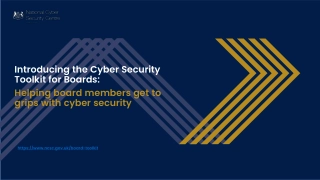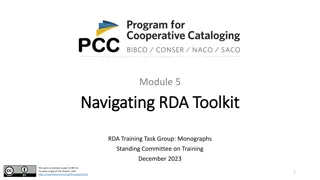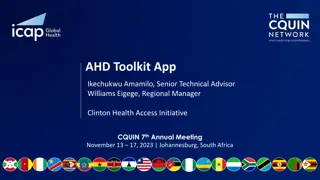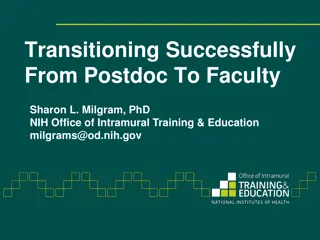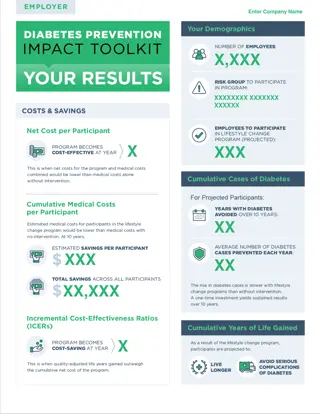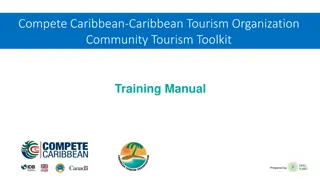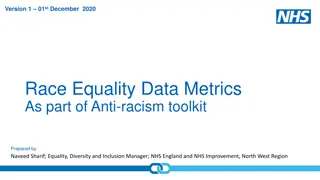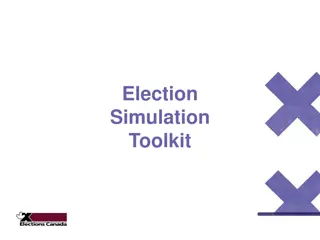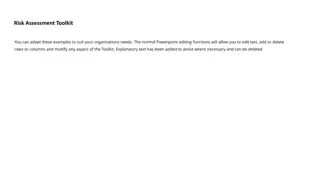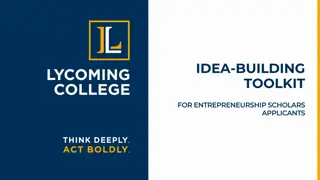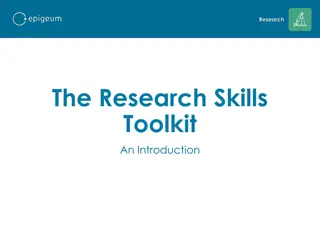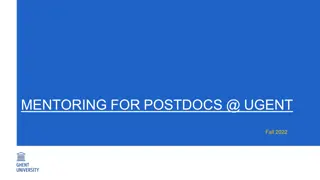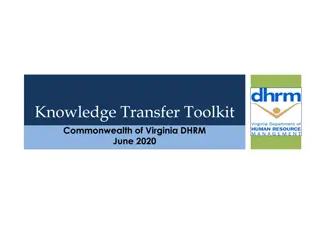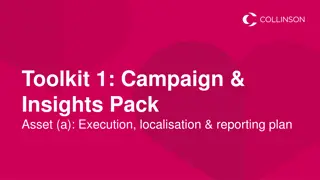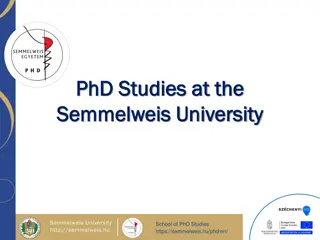From PhD to Postdoc: a toolkit
For undergraduates, graduates, and postdocs seeking career advancement, this toolkit provides guidance on exploring career options, building essential skills and networks, securing the right postdoc position, and planning for future career growth. Learn about various career paths, the importance of an Individual Development Plan, employed PhDs' roles in the US, and the relevance of postdoctoral training in different sectors.
Download Presentation

Please find below an Image/Link to download the presentation.
The content on the website is provided AS IS for your information and personal use only. It may not be sold, licensed, or shared on other websites without obtaining consent from the author.If you encounter any issues during the download, it is possible that the publisher has removed the file from their server.
You are allowed to download the files provided on this website for personal or commercial use, subject to the condition that they are used lawfully. All files are the property of their respective owners.
The content on the website is provided AS IS for your information and personal use only. It may not be sold, licensed, or shared on other websites without obtaining consent from the author.
E N D
Presentation Transcript
From PhD to Postdoc: a toolkit Objective: Obtaining the postdoctoral position that best prepares you for your future career goals Target audience: Undergraduate and graduate students, postdoctoral fellows looking to change laboratory
Outline 1) Exploring career options and deciding what you want to pursue 2) Building the skills and network needed for career advancement 3) Identifying and securing the right postdoctoral position 4) Planning for future career advancement
1. Career options & explorations Before you consider applying for a postdoctoral position: Explore your career options Chose what best fits your interests, goals and values Start thinking about career advancement early in your PhD training What are some tools you can use? Individual Development Plan Informational interviews (meetings with experts in different careers) Career Counselors/University Trainee Office Science Careers (AAAS) http://myidp.sciencecareers.org
Individual Development Plan http://myidp.sciencecareers.org
What are employed PhDs doing in the US? Of 787,000 employed scientists and engineers surveyed in 2015, 41% were primarily doing Research and Development (R&D). government 31,000 3.9% of total academia 137,000 17.4% of total R&D private sector, for-profit 124,000 15.8% of total Source: National Science Foundation, Survey of Doctorate Recipients, 2015
The R&D sector can be different in different regions Each country and political/economical area is different, for instance in the EU, most of the total population directly employed in R&D works outside academia Source: Eurostat
Do you need to do a postdoc? In the US, the remaining 59% employed PhD scientists and engineers primarily work in: other science or non-science related professions Journalism Information media Teaching Education Admin BSc Communication Education Note: Many career options do not require further postdoctoral training PhD Law Business R & D Science Policy Patent Intellectual Property Biotech Startup Venture Capital Postdoc Independent Investigator Academia and Government R&D in Biotech/Pharma
Postdoctoral opportunities outside of academia Several postdoctoral positions are available outside of the traditional academic path Postdoctoral programs at pharmaceutical companies (Merck, AstraZeneca, Genentech, Lilly and others) Postdoctoral position in government agencies such as NIH, FDA, CDC, etc. Postdoctoral opportunities in academia working on drug discovery as part of the Academic Drug Discovery Consortium (ADDC) Check the Careers/Jobs tabs on their websites to search for these opportunities
Questions to ask yourself What type of work do you want to do and what do you want to learn? Do you enjoy working at the bench? Do you like writing? Teaching? Helping others? Is there something you want to avoid doing? Do you prefer being part of a team? Do you see yourself as a leader/manager? In what area/sector do you want to do this work? Academia, pharma, government, non-profit Do you want a stable job? Or are you comfortable with changing/moving often? How do you handle stress and competitive pressure? What do you have to offer in terms of expertise, skills, ability? Use your Individual Development Plan to ask these and other questions
2. Key skills for career advancement Core competencies to be acquired during graduate education 1. Conceptual Knowledge 2. Research Skill Development 3. Rigorous and Responsible Conduct of Research 4. Communication Skills 5. Career Development and Professionalism
Assess your skills in these domains Achievement & Self-Adjustment: Learn and adapt quickly Perform under pressure Meet high expectations Work independently Take initiative Conceptual & Research Skills: Rigorous study design and development Understand complex content Gather and integrate a lot of information Problem solving Intellectual independence Communication & Interpersonal Skills: Written and oral proficiency Listening and understanding Convey complex info to experts and non- experts Work collaboratively Thrive in multi-disciplinary environments Leadership Conflict management Which of these skills do you still need to develop to reach your future career goals? Adapted from Jean Branan,, Program Coordinator, Career & Postdoctoral Services @ The Scripps Research Institute
Transferable skills to many careers Skills needed for the larger job market Writing and communication skills Time and project management skills People management and team-work experience You have already gained these skills by: Organizing your experiments Writing grants and papers Working with others in your lab and other labs
Opportunities for skill building during PhD Attend career development workshops Join and engage in professional societies Build and nurture relationships with multiple mentors and sponsors Mentors offer advice and guidance Sponsors influence and elevate your career Advocates champion and represent you to others Participate in service and leadership activities Choose opportunities that meet a specific interest or offers a tangible reward And NETWORK everywhere you go!
Build a mentoring team Committees with multiple mentors have become the norm for PhD training Each mentor may have a specific role inside and outside academia depending on what you need Scientific expertise, industry experience, teaching, balancing work with a family, applying for jobs Prepare before the meeting with ideas and topics to discuss Many mentoring relationships develop out of informal interactions A discussion over lunch at a conference can be a mentoring moment A peer or friend can be a mentor or connect you to mentors A mentoring relationship is built over time Don t be afraid to reach out. People (generally) love to talk about their research/jobs.
Networking for career transitions Networking is an essential skill for professional development Consists of developing and maintaining a group of supporters who can help you advance in your research and your career Networking with your peers can be as important as networking with senior scientists Allows others to learn about you and your research training and career goals Share through direct conversation, research proposals, or your CV/r sum Can lead to collaboration and new training opportunities Gives you access to information about the career track and environment ( insider information) Learn specifics about various lab environments/cultures
Tips for networking effectively Be yourself! Start where you are comfortable through people you already know Develop an elevator pitch to introduce your self: 2-3 non technical sentences about your interests, background and goals Be strategic Target individuals in labs/research areas to which you aspire Use scientific conferences to meet with potential research advisors or collaborators Be honest and direct Communicate what you need and how others may help you Follow up and stay connected Check in, share updates, ask for help/guidance Be a resource and help others achieve their goals Make introductions, offer help, be a peer-mentor
3. Career advancement via postdoc training The main goal of the postdoctoral training is to acquire additional transferable skills towards your next career goal Technical skills Further conceptual knowledge Communication skills (publications, presentations) Leadership/management skills Expanding your professional network A postdoctoral research experience should prepare you for the transition of trainee to independent researcher and allow you to develop an independent area of research/expertise Postdoctoral training is required for some careers (and career advancement) in academia, government and industry/pharma
Resources for finding a postdoc position Direct contact with researchers online via email or on social media on Twitter, ResearchGate, and LinkedIn Job Advertisements: Society for Neuroscience (https://neurojobs.sfn.org/jobs) FENS jobs and other societies Journal websites: Science Careers, Nature Jobs National Postdoc Association (http://careers.nationalpostdoc.org) University websites Research Professional Euro ScienceJobs
Applying for a postdoc position Plan and prepare for your postdoc search one year before you plan to defend Make contact with PI(s) you want to work with and/or their lab members before you apply Meet with the PI if they are invited for a seminar or invite them through the seminar committee Schedule a meeting with the PI at a conference Get to know the PI s lab members and alumni at conferences Obtain information about success of potential postdoc PI's trainees Be prepared and follow-up with PI Have a 2-3 minute elevator pitch ready and your business card Keep potential PI advisor updated on your progress (manuscripts, pre-prints, defense date) Identify fellowships that are suitable and beneficial for you to apply for
Your application materials A curriculum vitae or r sum is an opportunity to effectively advertise your experience and expertise for a particular position Your Skills Employer Need Your Value Adapted from Transforming your CV or Resume: Insider Tips for Any Position, SfN Webinar, 2015
Using a CV vs rsum Curriculum Vitae A comprehensive list of your full educational and professional history R sum A summary of your qualifications and skills that are relevant to a specific position Some research positions (industry), non-research positions Relevant skills and expertise Description Academic positions, some research positions (government, industry) Academic achievements and experience Dependent on experience; no page limit Typical use Focus Usually 1-2 pages Length
Tips for building a CV or rsum Tailor your CV/r sum for the specific position to which you re applying Your relevant experience/skills should match the position Use terms/keywords of the job description to show how you meet job requirements and preferred qualifications Highlight both technical and transferrable skills Use action verbs to describe your expertise and accomplishments (designed, developed, led, evaluated, initiated, etc) Format for ease of reading Include plenty of white space Bold key info Use bullet points rather than paragraphs
Typical interview Initial interview via phone or video chat (i.e. Skype or Google Hangout) In-person interview, if possible Give research talk to lab group Meetings with lab members Meetings with faculty with similar interests Meeting with Postdoctoral Office representatives (if applicable) Virtual interview, if in-person visit not possible (international candidates): Ask for phone/skype meetings with lab members
Preparation for the interview It is important that you know the research of the laboratory Read the primary papers from the lab from the last few years Look up SFN or other society abstracts (from past year) Be prepared to answer questions about your work and how it fits in with the lab to which you're applying Be prepared to ask questions about the PI's work and other related projects Review university website for additional training/professional development opportunities and benefits If meeting with other faculty, know their recent papers and be comfortable with discussing their work
Postdoc compensation and negotiation Know the cost of living and what you will need for your personal life/family planning in order to establish your minimum requirements Search for average salary at the national level and the institution(s) to which you apply Determine the length of the postdoc contract before funding runs out You may need to secure your own funding (fellowship) to start or continue your work Know the details of the offered salary + benefits package Health insurance benefits, retirement benefits, paid leave/sick days, paid maternity/paternity leave Identify additional perks that can stretch your salary, such as relocation reimbursement and university subsidies (housing, day-care, retirement, etc.)
Important topics of discussion / negotiation Things to consider in the broad discussion with your postdoc mentor/supervisor about the relationship you will have: Research projects and publications Training and teaching opportunities (internships) Support for fellowship and other grant applications Transition to independence Career development for positions outside of academia It is important to regularly meet with your mentor/supervisor to check the progress of and revise these topics as often as necessary.
How to negotiate effectively Knowing how to ask for what you need and negotiate if necessary is a critical professional skill. Define what you need and why this would be good for you and the lab You need higher salary because you want to live close to the lab, so that you don t have to commute Be open, honest, and direct about your needs and justify why they are important The dollar amount for your salary may not be adjustable, but you can negotiate other accommodations, benefits, and perks - Subsidized housing on campus - Funds for a personal laptop - Ability to telework as needed
Negotiate for your career progression too You chose to do a postdoc but are still considering job opportunities in industry, teaching, or publishing Ask about opportunities for further career development Active postdoc office Protected time and funds for career development activities You may be worried about asking the PI because they may think you are not fully committed to academia Ask the lab members first in casual conversation Make sure the PI understands the complexities of the current job market
4. Building a career through a postdoc Things you need to be competitive in the academic job market: Quality publications Grants Teaching experience Time, people, and money-management skills Leadership skills Continue to expand your mentoring team as your career development needs progress/change Remember that many of the skills acquired during PhD and postdoc training are transferable to any job, inside and outside academia Engage in training opportunities that fit your short- and long-term career goals
Publish or perish? Publications are still the measure of productivity for a postdoc and showcase your research and your creativity. First authorship is essential and means you led the project Balance risky and safe projects High-profile publications are preferred in high-profile universities, but are NOT sufficient to get a job Discuss clearly with your advisor what is expected of you. Long gaps in publishing (>5-6 years) are a red flag for search committees, even if a high-profile paper is obtained at the end. Strive for the best, while keeping an eye on your productivity. Be pragmatic.
Get grants! Its all about the money! For research-intensive positions, the ability to conduct fundable research is key Having a funded proposal is a huge plus for your CV Faculty search committee meetings are often told to look at how much money the applicant has secured Identify fellowships (both foundation and federal) you can apply to and mark deadlines in your calendar Remember that eligibility to many career development grants expires 3-5 years after your PhD graduation date A combination of postdoctoral fellowships (your salary) and transition to independence awards (other salaries and supplies) is best You should familiarize yourselves with federal grant structure and review process
Tips for writing an effective grant Develop a Strategy Start Early Plan Your Application Address All Review Criteria Submit All Required Components Work with your advisor on the following: Review organization s research priorities and goals Identify funding opportunities that match your needs Identify experienced mentor(s) and collaborators if necessary Learn about the application and review process Make early contact with program officers to discuss your interest in applying Study successfully funded grant applications Write clearly and concisely for reviewers to understand your proposed work
Should you care about teaching? Teaching opportunities for postdocs are limited, but teaching is a part of your application and interview in academia You may decide you want a teaching job For a research position teaching is not critical, but it helps Arrange guest teaching in a friend s or mentor s courses Teach sessions or workshops for friends/colleagues Actively mentor grad students and undergraduates For a teaching position you need to have developed curriculum, i.e. your own courses Have a clear conversation with your advisor about your goals Serve as teaching assistant (TA) for your advisor or adjunct at a nearby university Take teaching courses available at your university Look for teaching fellowships
So much to do, so few hours Balancing experiments with writing grants and papers requires time-management skills. Learning to prioritize and switch among different activities is important for any job. Set relevant milestones and keep the focus to reach them. Make a long term plan for the next 6-12 months. Track the deadlines and progress: productivity apps, paper calendar, Google calendar, whatever works for you Discuss the timeline with your advisor Negotiate protected time for writing or other activities (e.g. exclusive access to equipment) Get advice on feasibility of timeline and get them on board with the plan (writing letters, paying for conferences)
Summary and conclusions Start early to explore career options and decide what career(s) works best for you Use the Individual Development Plan to help you identify this Develop the relevant transferable skills you need for advancement in your desired career choice Network to explore career options and to meet future mentors/advisors Identify and secure a postdoctoral position that best fits your career goals Continue building your transferable skills and use your Individual Development Plan during your postdoc for future career advancement
Reading/Viewing list Check out the many resources on Neuronline, https://neuronline.sfn.org https://neuronline.sfn.org/Articles/Career-Paths/2017/Biomedical-Career-Options-for- Scientists-and-Physician-Scientists https://neuronline.sfn.org/Articles/Career-Advice/2018/How-to-Select-and-Plan-for-a- Postdoc And many others Martin Chalfie, What makes a good post-doc application? https://www.youtube.com/watch?v=x2fBwH6CupA UCSF video on career exploration https://www.youtube.com/watch?v=d-DoNgtfNcc#action=share InterSECT for job simulations https://intersectjobsims.com/library/
